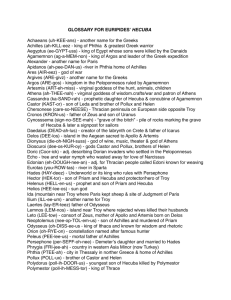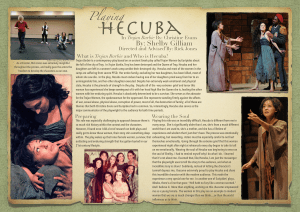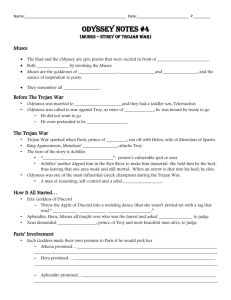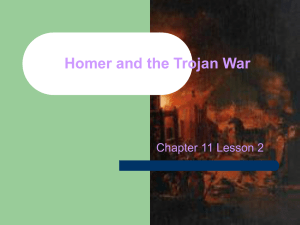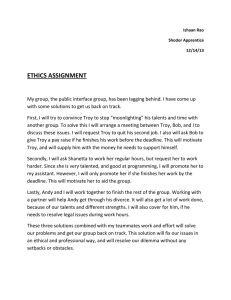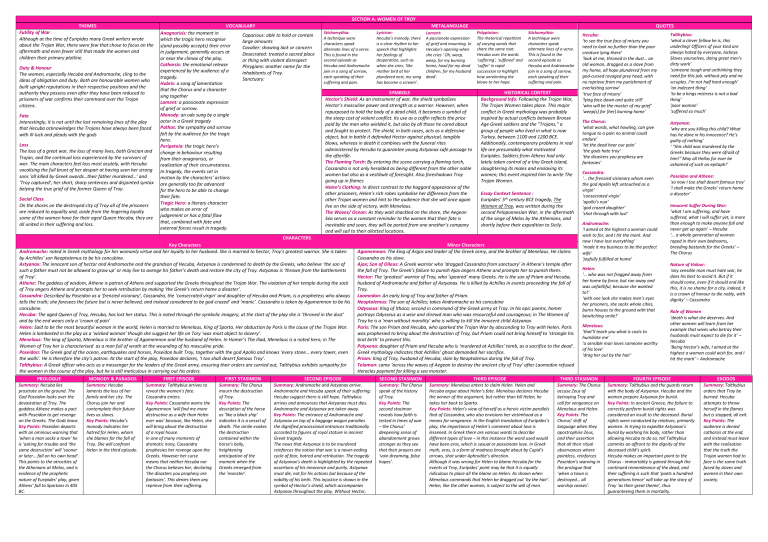
SECTION A: WOMEN OF TROY THEMES VOCABULARY Futility of War Although at the time of Euripides many Greek writers wrote about the Trojan War, there were few that chose to focus on the aftermath and even fewer still that made the women and children their primary plotline. Duty & Honour The women, especially Hecuba and Andromache, cling to the ideas of obligation and duty. Both are honourable women who built upright reputations in their respective positions and the authority they possess even after they have been reduced to prisoners of war confirms their command over the Trojan citizens. Fate Interestingly, it is not until the last remaining lines of the play that Hecuba acknowledges the Trojans have always been faced with ill-luck and pleads with the gods Loss The loss of a great war, the loss of many lives, both Grecian and Trojan, and the continual loss experienced by the survivors of war. The main characters feel loss most acutely, with Hecuba vocalising the full brunt of her despair at having seen her strong sons ‘all killed by Greek swords…their father murdered…’ and ‘Troy captured’; her short, sharp sentences and disjointed syntax belying the true grief of the former Queen of Troy. Social Class On the shores on the destroyed city of Troy all of the prisoners are reduced to equality and, aside from the lingering loyalty some of the women have for their aged Queen Hecuba, they are all united in their suffering and loss. Anagnorisis: the moment in which the tragic hero recognise s(and possibly accepts) their error in judgement, generally occurs at or near the climax of the play. Catharsis: the emotional release experienced by the audience of a tragedy. Hubris: a song of lamentation that the Chorus and a character sing together Lament: a passionate expression of grief or sorrow. Monody: an ode sung by a single actor in a Greek tragedy Pathos: the sympathy and sorrow felt by the audience for the tragic hero. Peripeteia: the tragic hero’s change in behaviour resulting from their anagnorisis, or realization of their circumstances. In tragedy, the events set in motion by the characters’ actions are generally too far advanced for the hero to be able to change their fate. Tragic Hero: a literary character who makes an error of judgement or has a fatal flaw that, combined with fate and external forces result in tragedy. METALANGUAGE Capacious: able to hold or contain large amounts Cavalier: showing lack or concern Desecrated: treated a sacred place or thing with violent disrespect Phrygians: another name for the inhabitants of Troy. Sanctuary: Stichomythia: A technique were characters speak alternate lines of a verse. This is found in the second episode as Hecuba and Andromache join in a song of sorrow, each speaking of their suffering and pain. Summary: Hecuba laments the loss of her family and her city. The Chorus join her and contemplate their future lives as slaves. Key Points: Hecuba’s monody indicates her hatred for Helen, whom she blames for the fall of Troy. She will confront Helen in the third episode. Summary: Talthybius arrives to reveal the women’s fate. Cassandra enters. Key Points: Cassandra warns the Agamemnon ‘will find me more destructive as a wife than Helen ever was’ because, like Helen, she will bring about the destruction of a royal house. In one of many moments of dramatic irony, Cassandra prophesies her revenge upon the Greeks. However her curse means that neither Hecuba nor the Chorus believes her, declaring ‘the disasters you prophesy are fantasies’. This denies them any reprieve from their suffering. Summary: The Chorus mourn the destruction of Troy. Key Points: The description of the horse as ‘like a black ship’ indicates it is a vessel of death. The simile evokes the destruction contained within the horse’s belly, heightening anticipation of the moment when the Greeks emerged from the ’monster’. Lament: A passionate expression of grief and mourning. In Hecuba’s opening when she cries ‘ Oh, weep, weep, for my burning home, howl for my dead children, for my husband dead’. SYMBOLS Hector’s Shield: As an instrument of war, the shield symbolizes Hector’s masculine power and strength as a warrior. However, when repurposed to hold the body of a dead child, it becomes a symbol of the steep cost of violent conflict. Its use as a coffin reflects the price paid by the man who wielded it, but also by all those he cared about and fought to protect. The shield, in both cases, acts as a defensive object, but in battle it defended Hector against physical, tangible blows, whereas in death it combines with the funeral rites administered by Hecuba to guarantee young Astyanax safe passage to the afterlife. The Flaming Torch: By entering the scene carrying a flaming torch, Cassandra is not only heralded as being different from the other noble women but also as a vestibule of foresight. Also foreshadows Troy going up in flames Helen’s Clothing: In direct contrast to the haggard appearance of the other prisoners, Helen’s rich robes symbolise her difference from the other Trojan women and hint to the audience that she will once again live on the side of victory, with Menelaus. The Waves/ Ocean: As they wait shackled on the shore, the Aegean Sea serves as a constant reminder to the women that their fate is inevitable and soon, they will be parted from one another’s company and will sail to their allotted locations. CHARACTERS Key Characters Andromache: noted in Greek mythology for her womanly virtue and her loyalty to her husband. She is married to hector, Troy’s greatest warrior. She is taken by Archilles’ son Neoptolemus to be his concubine. Astyanax: The innocent son of hector and Andromache and the grandson of Hecuba, Astyanax is condemned to death by the Greeks, who believe ‘the son of such a father must not be allowed to grow up’ or may live to avenge his father’s death and restore the city of Troy. Astyanax is ‘thrown from the battlements of Troy’. Athene: The goddess of wisdom, Athene is patron of Athens and supported the Greeks throughout the Trojan War. The violation of her temple during the sack of Troy angers Athene and prompts her to seek retribution by making ‘the Greek’s return home a disaster’. Cassandra: Described by Poseidon as a ‘frenzied visionary’, Cassandra, the ‘consecrated virgin’ and daughter of Hecuba and Priam, is a prophetess who always tells the truth; she foresees the future but is never believed, and instead considered to be god-crazed’ and ‘manic’. Cassandra is taken by Agamemnon to be his concubine. Hecuba: The aged Queen of Troy, Hecuba, has lost her status. This is noted through the symbolic imagery, at the start of the play she is ‘throned in the dust’ and by the end wears only a ‘crown of pain’ Helen: Said to be the most beautiful woman in the world, Helen is married to Menelaus, King of Sparta. Her abduction by Paris is the cause of the Trojan War. Helen is lambasted in the play as a ‘wicked woman’ though she suggest her life on Tory ‘was most abject to slavery’. Menelaus: The king of Sparta, Menelaus is the brother of Agamemnon and the husband of Helen. In Homer’s The Iliad, Menelaus is a noted hero; in The Women of Troy her is characterised as a man full of wrath at the wounding of his masculine pride. Poseidon: The Greek god of the ocean, earthquakes and horses, Poseidon built Troy, together with the god Apollo and knows ‘every stone… every tower, even the walls’. He is therefore the city’s patron. At the start of the play, Poseidon declares, ‘I too shall desert famous Troy’. Talthybius: A Greek officer who acts as a messenger for the leaders of the Greek army, ensuring their orders are carried out, Talthybius exhibits sympathy for the women in the course of the play, but he is still meticulous in carrying out his orders. PROLOGUE MONODY & PARADOS FIRST EPISODE FIRST STASIMON SECOND EPISODE Summary: Hecuba lies prostrate on the ground. The God Poseidon looks over the devastation of Troy. The goddess Athene makes a pact with Poseidon to get revenge on the Greeks. The Gods leave. Key Points: Poseidon departs with an ominous warning that ‘when a man sacks a town’ he is ‘asking for trouble and ‘the same destruction’ will ‘sooner or later… fall on his own head’. This points to the atrocities of the Athenians at Melos, and is evidence of the prophetic nature of Euripides’ play, given Athens’ fall to Spartans in 405 BC. Lyricism: Hecuba’s monody, there is a clear rhythm to her speech that highlights her feelings of desperation, such as when she cries, ‘like mother bird at her plundered nest, my song has become a scream’. QUOTES Polyptoton: The rhetorical repetition of varying words that share the same root. Hecuba uses the words ‘suffering’, ‘suffered’ and ‘suffer’ in rapid succession to highlight how unrelenting the blows to her hope. Stichomythia: A technique were characters speak alternate lines of a verse. This is found in the second episode as Hecuba and Andromache join in a song of sorrow, each speaking of their suffering and pain. HISTORICAL CONTEXT Background Info: Following the Trojan War, The Trojan Women takes place. This major conflict in Greek mythology was probably inspired by actual conflicts between Bronze Age Greek soldiers and the "Trojans," a group of people who lived in what is now Turkey, between 1100 and 1200 BCE. Additionally, contemporary problems in real life are presumably what motivated Euripides. Soldiers from Athens had only lately taken control of a tiny Greek island, slaughtering its males and enslaving its women; this event inspired him to write The Trojan Women. Essay Context Sentence : Euripides’ 5th century BCE tragedy, The Women of Troy, was written during the second Peloponnesian War, in the aftermath of the siege of Melos by the Athenians, and shortly before their expedition to Sicily. Hecuba: ‘to see the true face of misery you need to look no further than the poor creature lying there’ ‘look at me, throned in the dust… an old woman, dragged as a slave from my home, all hope plundered from my god-cursed ravaged grey head, with no reprieve from my punishment of everlasting sorrow’ ‘true face of misery’ ‘lying face down and quite still’ ‘who will be the master of my grief’ 'weep[s] for [her] burning home' Talthybius: ‘what a clever fellow he is, this underling! Officers of your kind are always hated by everyone, lackeys. Slaves yourselves, doing great men’s dirty work’ ‘someone tough and unthinking they need for this job, without pity and no scruples. I’m not half hard enough’ ‘an indecent thing’ ‘to be a kings mistress is not a bad thing’ ‘poor woman’ ‘suffered so much’ The Chorus: ‘what words, what howling, can give tongue to a pain no animal could endure’ ‘let the dead hear our pain’ ‘the gods hate troy’ ‘the disasters you prophesy are fantasies’ Astyanax: ‘why are you killing this child? What has he done in his innocence? He’s guilty of nothing’ ‘ “this child was murdered by the Greeks because they were afraid of him!” May all Hellas for ever be ashamed of such an epitaph!’ Cassandra: ‘… the frenzied visionary whom even the god Apollo left untouched as a virgin’ ‘consecrated virgin’ ‘apollo’s nun’ ‘god crazed daughter’ ‘shot through with lust’ Andromache: ‘I aimed at the highest a woman could wish to for, and I hit the mark. And now I have lost everything’ ‘made it my business to be the perfect wife’ ‘joyfully fulfilled at home’ Poseidon and Athene: ‘so now I too shall desert famous troy’ ‘I shall make the Greeks’ return home a disaster’ Innocent Suffer During War: ‘what I am suffering, and have suffered, what I will suffer yet, is more than enough to make anyone fall and never get up again’ – Hecuba ‘… a whole generation of women raped in their own bedrooms, breeding bastards for the Greeks’ – The Chorus Minor Characters Agamemnon: The king of Argos and leader of the Greek army, and the brother of Menelaus. He claims Cassandra as his slave. Ajax; Son of Oileus: A Greek warrior who ‘dragged Cassandra from sanctuary’ in Athene’s temple after Nature of Valour: Helen: ‘any sensible man must hate war, he the fall of Troy. The Greek’s failure to punish Ajax angers Athene and prompts her to punish them. ‘… who was not fragged away from does his best to avoid it. But if it Hector: The ‘greatest’ warrior of Troy, who ‘speared’ many Greeks. He is the son of Priam and Hecuba, her home by force, but ran away and should come, even if it should end like husband of Andromache and father of Astyanax. He is killed by Achilles in events proceeding the fall of was unfaithful, because she wanted this, it is no shame for a city, indeed, it Troy. to!’ is a crown of honour to die nobly, with Laomedon: An early king of Troy and father of Priam. ‘with one look she makes men’s eyes dignity’ – Cassandra Neoptolemus: The son of Achilles; takes Andromache as his concubine her prisoners, she sacks whole cities, Odysseus: King of Ithaca; second in command of the Greek army at Troy. In his epic poems, homer burns houses to the ground with that Role of Women portrays Odysseus as a wise and shrewd man who was resourceful and courageous; in The Women of bewitching smile!’ ‘death is what she deserves. And Troy he is a ‘man without morality’ who is willing to kill the innocent child Astyanax. other women will learn from her Menelaus: Paris: The son Priam and Hecuba, who sparked the Trojan War by absconding to Troy with Helen. Paris example that wives who betray their ‘that’ll teach you what is costs to was prophesied to bring about the destruction of Troy, but Priam could not bring himself to ‘strangle his husbands must expect to die for it’ – humiliate me’ brat birth’ to prevent this. Hecuba ‘a sensible man loves someone worthy Polyxena: daughter of Priam and Hecuba who is ‘murdered at Achilles’ tomb, as a sacrifice to the dead’. ‘Being Hector’s wife, I aimed at the of his love’ Greek mythology indicates that Achilles’ ghost demanded her sacrifice. highest a woman could wish for, and I ‘drag her out by the hair’ Priam: King of Troy, husband of Hecuba; slain by Neoptolemus during the fall of Troy. hit the mark’ – Andromache Telamon: came ‘across the waves of Aegean to destroy the ancient city of Troy’ after Laomedon refused Heracles payment for killing a sea monster. SECOND STASIMON THIRD EPISODE THIRD STASIMON FOURTH EPISODE EXODOS Summary: Andromache and Astyanax arrive. Andromache and Hecuba speak of their suffering; Hecuba suggest there is still hope. Talthybius arrives and announces that Astyanax must dies. Andromache and Astyanax are taken away. Key Points: The entrance of Andromache and Astyanax on top of a baggage wagon parodies the dignified processional entrances traditionally accorded to figures of royal stature in ancient Greek tragedy. The news that Astyanax is to be murdered reinforces the notion that war is a never-ending cycle of fear, hatred and retribution. The tragedy of Astyanax’s death is highlighted by the repeated assertions of his innocence and purity. Astyanax must die, not for his actions but because of the nobility of his birth. This injustice is shown in the symbol of Hector’s shield, which accompanies Astyanax throughout the play. Without Hector, Summary: The Chorus speak of the history of Troy. Key Points: The second stasimon reveals how faith is tested in times of war – the Chorus’ deepening sense of abandonment grows stronger as they see that their prayers are ‘vain dreaming, false hopes’. Summary: Menelaus enters to claim Helen. Helen and Hecuba argue about Helen’s fate. Menelaus declares Hecuba the winner of the argument, but rather than kill Helen, he takes her back to Sparta. Key Points: Helen’s view of herself as a heroic victim parallels that of Cassandra, who also envisions her victimhood as a means for vengeance. In the English translation of Euripides’s play, the importance of Helen’s comment about love is lessened. In Greek there are various words to describe different types of love – in this instance the word used would have been eros, which is sexual or passionate love. In Greek myth, eros, is a form of madness brought about by Cupid’s arrows, shot under Aphrodite’s direction. Although it was wrong for Helen to blame Hecuba for the events at Troy, Euripides’ point may be that it is equally ridiculous to place all the blame on Helen. As shown when Menelaus commands that Helen be dragged out ‘by the hair’. Helen, like the other women, is subject to the will of men. Summary: The Chorus accuse Zeus of betraying Troy and call for vengeance on Menelaus and Helen. Key Points: The Chorus’ shift of language when they apostrophise Zeus, and their assertion that all their ritual observances where pointless, reinforces Poseidon’s warning in the prologue that ‘when a town is destroyed… all worship ceases’. Summary: Talthybius and the guards return with the body of Astyanax. Hecuba and the women prepare Astyanax for burial. Key Points: In ancient Greece, the failure to correctly perform burial rights was considered an insult to the deceased. Burial rights were conducted by relatives, primarily women. In trying to expedite Astyanax’s burial by washing his body, rather than allowing Hecuba to do so, tell Talthybius commits an affront to the dignity of the deceased child’s spirit. Hecuba makes an important point to the Chorus - immortality is gained through the continued remembrance of the dead, and their suffering is such that ‘poets a hundred generations hence’ will take up the story of Troy ‘as their great theme’, thus guaranteeing them in mortality. Summary: Talthybius orders that Troy be burned. Hecuba attempts to throw herself in the flames but is stopped; all exit. Key Points: The audience is denied catharsis at the end, and instead must leave with the realisation that the truth the Trojan women had to face is the same truth faced by slaves and women in their own society. the shield is nothing but an impotent symbol of the lost father.
